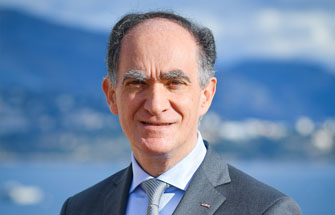While 2021 was also hit by the pandemic, Monaco continues to steer a course towards innovative governance while protecting the financial industry and the dynamic nature of the wider Monegasque economy. Interview with Mr Jean Castellini, Minister of Finance and Economy.
In the second year of the pandemic, what has been the Government’s strategy for saving companies?
The Government has pursued a recovery and support strategy, notably through the flagship Economic Recovery Support Commission (CARE), which specifically targets Monegasque businesses that have been hard it by the global crisis.
In addition, the State has made use of a range of funds (Blue, White, Green, and Red and White) under its recovery through investment plan to provide sustainable support to businesses in the Principality and to households who want to consume more responsibly and locally.
The Blue Fund, for example, seeks to promote economic recovery by helping local businesses to embark on a digital transition while also supporting the Monegasque digital services industry.
As part of the “Revivez vos Quartiers” (“Bring Your Neighbourhood Back to Life”) initiative, the Prince’s Government is funding the organisation of events by local service providers in retail districts. This win-win scheme supports the events industry and the retail sector.
In a similar vein, the provision of gift vouchers through the Carlo app, an initiative introduced in late 2020, has helped to revitalise local consumption while at the same time creating a dynamic and supportive community. Although the gift voucher scheme drew to a close in June, the State is continuing to support shops and restaurants by covering the platform fees usually charged by the Carlo app, and will do so for the whole of 2021.
At the same time, the Government is also putting in place specific measures to respond to the needs of particularly hard hit local business activities in the shorter term. For example, it is funding some of the cost of dismantling terraces during the Grand Prix events, covering the fees charged to shops and restaurants for occupying space on the public highway (in partnership with Monaco City Hall), and providing cash for event agencies who need to secure bookings.
In addition, there have been some changes to the provisions for state-backed loans. Given the length and severity of the crisis, a decision was taken to postpone the grace period and to allow companies to ask their bank to extend the repayment term if they felt that it was necessary. In some cases, loan repayment terms can be extended to 84 months, including a 24-month grace period.
Finally, in consultation with the National Council and employers’ associations, the Prince’s Government has also maintained its own commitment to employment and supporting employers by extending the strengthened provisions for total temporary layoff (CTTR) until 30 September 2021 and continuing to support the recovery during the summer period.
Through these various specific and cross-cutting actions, the Government is pursuing a pragmatic, supportive policy which seeks to protect Monegasque companies that usually contribute to the Principality’s dynamic economy and international profile.
For a number of years, the Principality has had an active policy on combatting money laundering and terrorist financing. On the eve of the MONEYVAL evaluation, what is the Principality’s position?
Through SICCFIN, the Principality of Monaco has developed the National Risk Assessment Strategy, which gives us a precise overview of our vulnerabilities and risks with regard to money laundering and terrorist financing. It involves the financial sector, but also other parts of the economy, such as the property and gambling sectors... This approach has mobilised all stakeholders and secured buy-in. It is being coordinated by SICCFIN, allowing us to introduce an action plan and a national strategy to reduce our vulnerabilities.
You took part in a high-level meeting organised by the Coalition of Finance Ministers for Climate Action last April. How can we combine economic growth and a low-carbon economy?
Alongside Switzerland and Luxembourg, the Principality of Monaco is one of the leading European centres for private banking. Through his decades-long commitment to sustainable development, H.S.H. the Prince is an example for his country that both public and private banking and financial institutions are now bound to follow.
In a globalised economy, the success of both corporate and investment strategies is increasingly dependent on ESG (environmental, social and governance) or SRI (socially responsible investing) selection criteria. Incorporating these factors as part of analysis, financial investment and risk management is likely to improve yields, but also to reduce risks, especially systemic risks, and is a major factor in competitiveness on the international stage.
Bankers, fund managers, private managers and institutional clients have recognised, for themselves and for their clients, the value of integrating a “sustainable” approach within their decision-making processes. Considering sustainable development as part of management processes will therefore contribute to achieving financial goals, on the one hand, and the key targets set out in the Paris Agreement and/or the United Nations Sustainable Development Goals (SDGs), on the other.
The Ministry of Finance and Economy, working closely with the Monaco Association for Financial Activities and experts, some of whom are based in Monaco, intends to make 2021 the year in which the Monaco Sustainable Finance initiative is launched. An initial questionnaire designed to provide an overview of the situation has been completed by professionals working in the industry and was the subject of a presentation to a working group. The results are currently being analysed. This will serve as a road map from which both professionals and investors can draw inspiration in future.






